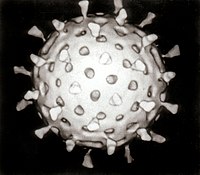
Photo from wikipedia
Rotavirus gastroenteritis is one of the leading causes of pediatric morbidity and mortality worldwide in infants and under-five populations. The World Health Organization (WHO) recommended global incorporation of the rotavirus… Click to show full abstract
Rotavirus gastroenteritis is one of the leading causes of pediatric morbidity and mortality worldwide in infants and under-five populations. The World Health Organization (WHO) recommended global incorporation of the rotavirus vaccine in national immunization programs to alleviate the burden of the disease. Implementation of the rotavirus vaccination in certain regions of the world brought about a significant and consistent reduction of rotavirus-associated hospitalizations. However, the efficacy of licensed vaccines remains suboptimal in low-income countries where the incidences of rotavirus gastroenteritis continue to happen unabated. The problem of low efficacy of currently licensed oral rotavirus vaccines in low-income countries necessitates continuous exploration, design, and development of new rotavirus vaccines. Traditional vaccine development is a complex, expensive, labor-intensive, and time-consuming process. Reverse vaccinology essentially utilizes the genome and proteome information on pathogens and has opened new avenues for in-silico multiepitope vaccine design for a plethora of pathogens, promising time reduction in the complete vaccine development pipeline by complementing the traditional vaccinology approach. A substantial number of reviews on licensed rotavirus vaccines and those under evaluation are already available in the literature. However, a collective account of rotavirus in-silico vaccines is lacking in the literature, and such an account may further fuel the interest of researchers to use reverse vaccinology to expedite the vaccine development process. Therefore, the main focus of this review is to summarize the research endeavors undertaken for the design and development of rotavirus vaccines by the reverse vaccinology approach utilizing the tools of immunoinformatics.
Journal Title: ACS Omega
Year Published: 2022
Link to full text (if available)
Share on Social Media: Sign Up to like & get
recommendations!